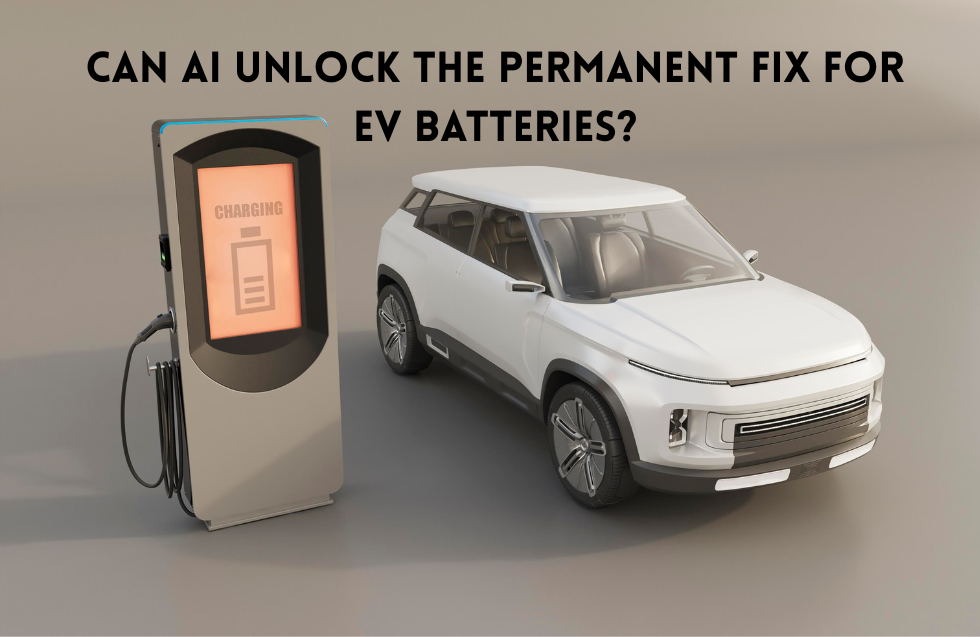Electric Vehicles(EVs) are no longer the stuff of science fiction, they are here, powered by EV batteries that still need major improvements before mainstream adoption. In 2024, EV sales worldwide surpassed 14 million units, as reported by The International Energy Agency suggesting even greater momentum for 2025 from analysts. But even with their swift increase, EVs continue to contend with a significant stumbling block: the battery issue.
Range anxiety, sluggish charging, degradation of batteries and the cost of high replacement are still inhibiting drivers from adopting electric mobility completely. That’s where artificial intelligence comes into play. Its capacity to analyze huge chunks of data and make predictive choices means that AI can possibly be the missing link in producing a permanent solution for EV batteries and hence, the future of electric mobility.
Why EV Batteries Remain a Challenge in 2025
EV batteries are robust but far from flawless. Some of the most significant challenges are:
- Degradation over time – Lithium-ion EV batteries lose their ability after repeated charging.
- Range limitations – Long journeys still require careful planning around charging stops.
- Charging speed – With fast chargers, a full charge still takes considerably longer than filling an automobile gas tank.
- Cost – Batteries represent almost 30 to 40 percent of an EV’s overall price.
So, how can AI be used to address such problems? Let’s find out.
How AI Can Boost EV Batteries
1. Data-Driven Battery Performance
Maybe the most exciting application of AI in electric vehicles is learning based on real-world data. EVs produce terabytes of data daily, driving patterns, charging cycles and more.
By processing this data, AI systems can:
- Anticipate when a battery may wear out.
- Recommend optimal charge patterns to maximize battery lifespan.
- Tailor energy management to specific drivers.
It’s not just theory. In 2024, some EV manufacturers began road-testing AI-driven battery management systems (BMS) that have the potential to extend battery life by as much as 20%.
2. Intelligent Charging Efficiency
Efficient charging of EV batteries is a top concern for both manufacturers and drivers alike. AI can alter charging speeds depending on battery health, temperature and grid demand. This achieves:
- Less energy waste.
- Less overheating.
- Faster charging made it safe and reliable.
Several others, such as Tesla and BYD are already testing AI algorithms that reduce charging time while maintaining battery longevity.
3. Improved Safety With Machine Learning
Safety is paramount for EV’s uptake. Machine learning algorithms can spot early warning signs in EV batteries, such as a thermal runaway or major cause of fires. By identifying anomalies in real time, AI becomes a predictive safety net. This isn’t science fiction.
In late 2024, Stanford researchers created an AI model that could detect battery defects 95% quicker than the current practice.
4. Route Optimization with Charging in Mind
Range anxiety is when the EV’s driver does not know where or when to charge. AI can produce safe and secure routes, including traffic, terrains and charging stations. Some EV navigation systems already suggest stops, but with AI, the system becomes familiar with your driving style and makes sure you’re never left stranded.
Imagine planning a coast-to-coast road trip and leveraging AI to think through the charging stops for your electric vehicle (EV) with little to no delay, that’s a huge win for EV acceptance.
5. AI in Autonomous EVs
Electric vehicles and autonomous vehicles are tightly coupled. AI enables not just the autonomous technology of AVs, but also how the battery performance can effectively support long-distance travel, ride-sharing fleets and 24/7 uptime. Therefore, AV’s will continue to rely on predictive models of battery state in order to keep them operational and to increase safety.
Current updates you may find interesting (2024-2025)
- Solid-state batteries: In the year 2024, Toyota and QuantumScape made headlines in the electric vehicle space for showing progress in the solid state batteries. Although both companies are still testing solid-state and continue to work out the chemistry, it is now clearly understood that AI will play an important part in dealing with the complexities that arise.
- AI-driven BMS deployment: In 2025, some EV start-ups are introducing models that will feature AI-driven battery management systems with assurances to enhance battery lifespan and reliable performance.
- Charging networks go intelligent: Operators such as ChargePoint and Ionity are applying AI technology to balance grid loads and reduce stress to the grid during peak hours. These advancements illustrate that AI isn’t simply a concept, it’s being implemented actively within the EV sector.
FAQs Regarding AI and EV Batteries
Q1: In the context of AI integration for EVs, what role does data play as it relates to functionality?
EVs can use accessory data and environmental conditions related to driving events and charging to improve battery efficiency and maximize travel range while minimizing wear.
Q2: How does AI make EV batteries charge faster and efficiently?
AI alters/time HA charging speeds based upon available data in real time to limit overheating and the overall charging process.
Q3: In what ways can machine learning improve the safety functionality of EVs?
Machine learning algorithms can help in recognizing anomalies/variations in voltage, temperature and current data and they can also possibly predict failures of the EV battery.
Q4: What are some of the ways AI enhances the user experience for charging?
AI can recommend when to charge your EV (e.g., electricity is cheapest) and to help recommend the best options for stops at gas stations to charge when taking a long-haul trip.
Q5: How might AI create the best route by accounting for available charging stations?
AI will consider range, charging availability and time to travel to provide the best most efficient charging capabilities while factoring in limited stops to re-charge.
Q6: What is the role that AI plays on self-driving electric cars?
AI will manage a fully charged automatic EV with a healthy battery, will predict when maintenance is needed on the car and will establish the most efficient charging cycles for long trips and with fleets of EVs.
Q7: How can I access research or materials on AI for EVs?
Several universities and EV startups release whitepapers. A search on “Artificial Intelligence in electric vehicles PDF” tends to yield academic studies or technical reports.
The Road Ahead
AI won’t fix every challenge with EV batteries overnight but it’s becoming a vital tool in making electric mobility safer, more reliable and more affordable. With intelligent charging and predictive maintenance being some applications AI can offer to make EVs more convenient, safer and reliable.
So, here in 2025 and beyond, the real question is not whether AI will change EV batteries- but how quickly. With innovation accelerating at record speed, the response could be: sooner rather than later.












